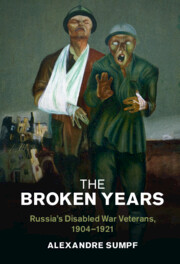Book contents
- The Broken Years
- Studies in the Social and Cultural History of Modern Warfare
- The Broken Years
- Copyright page
- Contents
- Figures
- Tables
- Acknowledgements
- Note on Usage
- Introduction
- 1 An Overwhelming Loss
- 2 The Right to Health
- 3 A Social Status Renegotiated by the War
- 4 Discriminatory Social Welfare
- 5 An Ephemeral Political Spring
- 6 The Devaluation of the War Experience
- Conclusion
- Bibliography
- Index
3 - A Social Status Renegotiated by the War
Published online by Cambridge University Press: 10 February 2022
- The Broken Years
- Studies in the Social and Cultural History of Modern Warfare
- The Broken Years
- Copyright page
- Contents
- Figures
- Tables
- Acknowledgements
- Note on Usage
- Introduction
- 1 An Overwhelming Loss
- 2 The Right to Health
- 3 A Social Status Renegotiated by the War
- 4 Discriminatory Social Welfare
- 5 An Ephemeral Political Spring
- 6 The Devaluation of the War Experience
- Conclusion
- Bibliography
- Index
Summary
The state’s military engagement created the impossibility of returning to a normal civilian life, thus requiring the invention of a new social status. Whereas society was divided on the basis of residential location and professional activity, the war cut across social classes, making certain categories of victims permanent recipients of support. The Law of 23 June 1912, first aimed at veterans of the war against Japan, was adapted over the course of the two following conflicts: it established the definition of a wounded soldier, then of a disabled veteran, and finally of a disabled person in general. The law set thresholds that were constantly debated, pensions that were endlessly disputed, and rights (to clothing, housing, food, education) that remained mainly theoretical. The vast majority of disabled ex-servicemen remained passive, only existing on the basis of lists drawn up by hospitals or administrative offices. But a minority of individuals sought to understand their rights, take advantage of possibilities open to them, and secure concrete recognition of the state’s moral debt. With their demands, they fortified their legal status and improved the plight of their group by forcing experts to be more rigorous and precise. In this way, the state of war thus furthered the rule of law in Russia.
- Type
- Chapter
- Information
- The Broken YearsRussia's Disabled War Veterans, 1904–1921, pp. 104 - 135Publisher: Cambridge University PressPrint publication year: 2022



